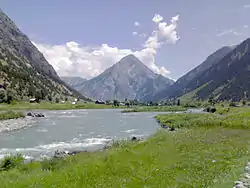Habba Khatoon
Habba Khatoon (born Zoon; 1554 – 1609; sometimes spelled Khatun), also known by the honorary title The Nightingale of Kashmir, was a Kashmiri Muslim poet and ascetic. She was the wife of Yousuf Shah Chak, the last Emperor of Kashmir.
| Habba Khatoon | |
|---|---|
| The Nightingale of Kashmir | |
| Empress Consort of Kashmir | |
| Tenure | 1579 – 1586 |
| Born | Zoon 1554 Chandhur, Pampore, Kashmir |
| Died | 1609 (aged 54–55) Kashmir |
| Burial | Athwajan, Jammu-Srinagar National Highway, Kashmir |
| Spouse | |
| Issue | At least 1 (daughter) |
| House | Chak Dynasty |
| Father | Abdi Rather |
| Mother | Janam |
| Writing career | |
| Occupation | Poet |
| Language | Kashmiri |
| Subject | Poems and songs about loss and separation |
| Notable works | Loal |
| Years active | c. 1570 – 1609 |
Biography
She was born in a small village in Pampore, Pulwama in Jammu and Kashmir. Her real name was Zoon or Zun (Kashmiri : زوٗن : The Moon), a common Kashmiri first name.[1] According to the oral tradition, she was called Zoon because of her great beauty. Although a peasant, she learnt how to read and write from the village moulvi.
According to legend, one day Yousuf Shah Chak was out hunting on horseback. He heard Zoon singing under the shade of a chinar tree, and the couple met and fell in love. The oral tradition describes Zoon as Yousuf Shah Chak's queen consort, although there is scholarly debate about whether she was in fact a lower status mistress or member of his harem.[2] She entered the palace in about 1570, and at some point changed her name to become Habba Khatoon ( Kashmiri : حبہٕ خوتوٗن).
The couple were reportedly very content, and Yousuf Shah became the ruler of Kashmir. However, they were separated in 1579 after the Mughal emperor Akbar had Yousuf Shah arrested and imprisoned in Bihar, never to return. After this, Habba Khatoon became an ascetic,[3][4] and spent the rest of her life wandering across the valley singing her songs.
Habba Khatun composed songs in Kashmiri. It is claimed that she introduced "loal" to Kashmiri poetry, "Loal" is more or less equivalent to the English 'lyric'. It conveys one brief thought. Braj Kachru states that Habba Khatun and Arnimal "perfected the loal form of Kashmiri poetry".[1]
There is some dispute about the historical accuracy of Habba Khatun's biography, however the songs associated with her (including Mea ha keir tsei kith and Tse Kamiu Soni Meani) are widely popular across Kashmir. Her songs are frequently mournful and full of the sorrow of separation. Her tomb lies near Athwajan (English connotation: Handful of Rings) on the Jammu-Srinagar national highway.[3]
She has a profound presence in the oral tradition and is hailed as the last independent poet queen of Kashmir.
Legacy

An underpass in Mughalpura, Lahore has been named after Habba Khatoon.
Indian Coast Guard has also named a ship as CGS Habba Khatoon after her name
References
- Kachru, Braj Behari (1981). Kashmiri literature. Harrassowitz. ISBN 3447021292. OCLC 1014524295.
- Sadhu, S. L. (1983). Haba Khatoon. ISBN 9788126019540. OCLC 1007839629.
- "A grave mistake". The Tribune. 3 June 2000. Retrieved 10 March 2013.
- Kalla, Krishan Lal (1985). "19. Nightingale of Kashmr". The Literary Heritage of Kashmir. Mittal Publications. p. 21.
Further reading
- Wakhlu, S. N. (1994). Habba Khatoon: the nightingale of Kashmir. South Asia Publications. ISBN 8174330054.